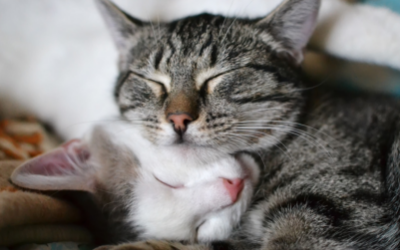
When it comes to heartworm disease, dogs are probably the first pets that come to mind, but cats can get them too. In fact, studies have shown that the incidence of heartworm disease in cats is much greater than previously thought. Cats are not a natural host for heartworms and are relatively resistant when compared with dogs, but we still see an infection rate of 5-20% of the rate of dogs within the same geographic area.
Cats become infected by heartworms the same way dogs do: through the bite of a hungry, infected mosquito. Many pet owners are surprised to learn that about a third of heartworm-infected cats are indoor cats. Think of how easily a mosquito can enter your home – through an open door as you enter or leave, or a small tear in a window screen. How many times have you swatted at a mosquito inside? Though your cat may be an indoor cat, that does not make her immune to heartworm disease.
Cats must be bitten directly by a heartworm-infected mosquito; heartworm cannot be transmitted from one cat to another, or from a dog to a cat. When mosquitos land on a cat and have a blood meal, they insert their sharp mouthpieces into the cat’s body. They then deposit microscopic heartworm larvae into the cat’s bloodstream as they feast on the cat’s blood. In dogs, the larvae mature over several months eventually migrating to the heart and lungs. As cats are atypical hosts, many larvae never mature to adult heartworms but they still cause problems. Immature heartworm larvae cause a condition in cats called heartworm associated respiratory disease (HARD).
Because so few heartworm larvae mature to adults, cats can be particularly difficult to diagnose with heartworm. There are no specific clinical signs in cats, although they may show non-specific signs such as lethargy, lack of appetite or weight loss. The most common sign is the sudden onset of a cough and difficulty breathing, which can often be mistaken for and/or misdiagnosed as asthma (HARD). Sometimes, an apparently-healthy cat may be found dead or develop sudden respiratory failure leading to death, in which case heartworm disease may be diagnosed post-mortem.
Unfortunately, there is no medication to kill heartworms that is approved or safe for treating cats, as there is for dogs. Treatments are usually supportive, focusing on managing symptoms of the disease and preventing the reproduction of new heartworms. Surgical removal of the worms is possible but is often reserved for cats with poor prognosis without surgery.
The best way to prevent heartworms in your cat is to give your cat a heartworm preventive. In warmer climates where mosquitos are active year-round, cats should receive a preventive year-round. In colder climates where mosquitos are seasonal, cats should be on a preventive for at least 6 months of the year, starting before mosquitos become active, although there are many benefits to year-round prevention in all cats. There are many forms of preventive, usually given monthly; they may be given orally or applied topically. Your veterinarian can suggest products that best fit your needs.
During Heartworm Awareness Month, talk to your veterinarian about the best heartworm preventive plan for your cat. After all, an ounce of prevention is worth a pound of cure!